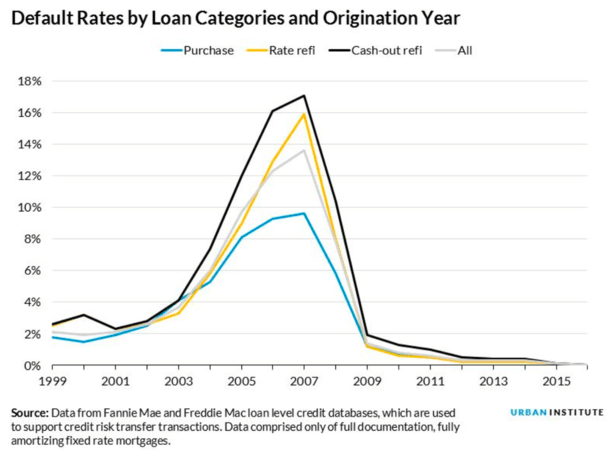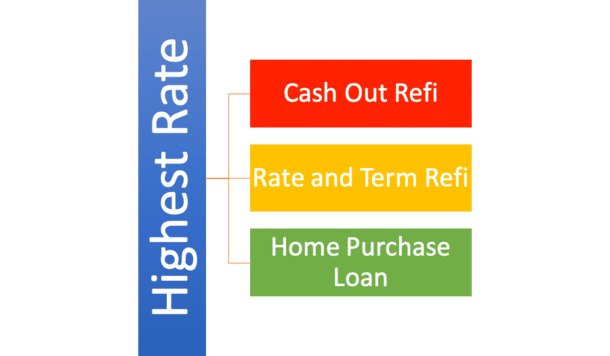Mortgage Q&A: “Why are refinance charges increased?”
For those who’ve been evaluating mortgage charges these days in an effort to avoid wasting cash on your property mortgage, you might have seen that refinance charges are increased than buy mortgage charges.
This appears to be the case for lots of massive banks on the market, together with Chase, Citi, and Wells Fargo, which whereas huge establishments, aren’t essentially the leaders within the mortgage biz anymore.
In truth, as we speak United Wholesale Mortgage within the #1 spot, adopted by Rocket Mortgage, then a mixture of these massive banks and nonbanks, together with CrossCountry Mortgage, Fairway Impartial Mortgage, and others.
So why is that a number of the massive guys checklist “buy charges” and “refinance charges” individually, with completely different pricing, factors, and APRs?
Properly, for starters a house buy shouldn’t be the identical as a mortgage refinance, regardless of each processes being very comparable, and the underlying loans themselves not a lot completely different.
In the end, a house buy mortgage is for somebody who has but to purchase a property, whereas a mortgage refinance is for an current house owner who needs to redo their dwelling mortgage.
We all know they’re completely different targets, but when the underlying loans are each 30-year mounted mortgages with the identical mortgage quantities, the identical borrower credit score scores, and the identical property sorts, why ought to charges be any completely different? Let’s discover out.
Dwelling Buy Mortgages Default the Least

There are three major kinds of mortgages, together with dwelling buy loans, price and time period refinances, and money out refinances.
The primary is self-explanatory and was already defined above, the second is just redoing your current mortgage by acquiring a brand new rate of interest and mortgage time period, with out altering the mortgage quantity.
The third kind ends in a bigger mortgage quantity at closing since you’re pulling fairness from your property, which a layman ought to assume could be the riskiest transaction.
In spite of everything, if a borrower owes extra debt consequently, and possibly even has the next month-to-month mortgage fee, their hypothetical default threat ought to rise.
Merely put, while you pull money out of your property, you enhance your excellent mortgage stability, enhance your loan-to-value ratio (LTV), and scale back your accessible dwelling fairness.
That’s inherently riskier, and explains why there are particular mortgage pricing changes for such loans.
This in idea ought to end in the next mortgage price to compensate for elevated threat. And guess what – that’s certainly the case!
Money out refinance charges are the very best, all else being equal, for principally all banks and lenders. At the least one thing is sensible round right here…
A Price and Time period Refinance Sounds the Least Dangerous, Doesn’t It?

Now, a price and time period refinance ought to end result within the least quantity of default threat as a result of the borrower is probably going lowering their month-to-month fee within the course of. That’s usually the motive to refinance within the first place.
This occurs by way of a decrease rate of interest and probably a decrease excellent stability (paid down since origination) unfold out over a brand-new mortgage time period.
That leaves us with dwelling buy loans, which you’d suppose could be much less dangerous than a money out refinance, however not as dangerous as a price and time period refinance, because it’s ostensibly a first-time dwelling purchaser or somebody in a brand new property.
For those who had been the financial institution, you’d most likely wish to give a brand new, cheaper mortgage to the seasoned house owner who has been paying their mortgage for years versus the first-time purchaser or perhaps a move-up purchaser taking over extra debt.
However for one motive or one other, some banks and mortgage lenders provide the bottom mortgage charges on dwelling buy transactions.
The Lowest Mortgage Charges Are Provided on Dwelling Buy Loans
The rationale boils right down to DATA. Although the precise mortgage traits (akin to FICO rating, LTV, and DTI) would point out the bottom default charges on price and time period refinances, it’s buy loans that carry out the most effective.
One potential motive why is due to defective value determinations on refinances, which maybe overvalue properties.
Regardless, buy mortgages default the least, adopted by price and time period refinances, and eventually money out refinances, the final of which truly is sensible.
Apparently, the mortgage traits additionally point out that money out refis and buy mortgages ought to default at about the identical price, but they’re priced the furthest aside.
And once more, that’s as a result of in actual life, not anticipated default charges, buy loans default the least and money out refis default probably the most.
Lowest: Dwelling buy charges
Barely Greater: Price and time period refinance charges
Highest: Money out refinance charges
So while you evaluate mortgage lenders, you typically would possibly discover that buy charges are the most affordable, adopted by price and time period refi charges, and eventually money out mortgage charges.
There’s no query money out refinances value probably the most – that is the norm amongst all banks and lenders to my information.
However not all banks/lenders provide completely different charges for purchases and price and time period refis. Generally they’re simply priced precisely the identical.
How A lot Extra Costly Are Refinance Charges?
- Large banks are likely to promote increased refinance charges vs. buy charges
- Some lenders don’t differentiate between buy charges and price and time period refi charges
- Or just cost barely increased closing prices on refinance transactions
- Charges could also be .25% to .375% increased on refis however take note of factors charged and mortgage assumptions
I regarded round and located that Chase, Citi, and Wells Fargo provide decrease dwelling buy charges, whereas Quicken Loans provides the identical precise charges for purchases and price and time period refis.
Quicken even says this of their wonderful print: “Based mostly on the acquisition/refinance of a main residence with no money out at closing.”
In different phrases, a purchase order and price and time period refi are priced the identical.
Clearly this issues when procuring round for a mortgage, so take discover of who’s charging extra/much less for sure transaction sorts and select accordingly based mostly on what you’re searching for.
The identical is likely to be true of an FHA mortgage vs. standard mortgage. Relying on what you want, one lender might provide a significantly better value.
One last item – take note of the assumptions lenders make after they checklist their charges. It is also that you simply’re not evaluating apples to apples, if there are completely different mortgage quantities, LTVs, credit score scores, mortgage factors, and so forth.
However know refinance charges are increased as a result of they default greater than buy loans, and that requires the next value to compensate for heightened threat, plain and easy.

